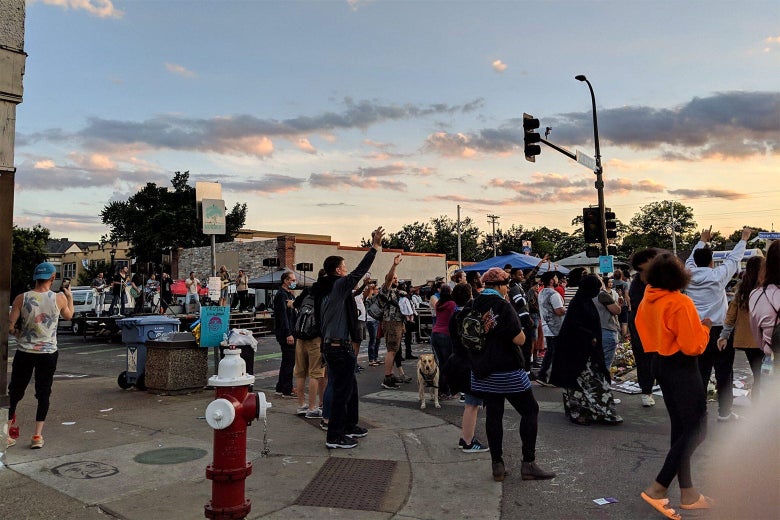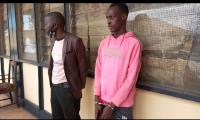The Street Corner Where George Floyd Was Killed Has Become a Christian Revivalist Site
Written by Sunlight Radio America on July 3, 2020

In the month since George Floyd was killed by a Minneapolis police officer, the scene of his death has become a sprawling unofficial gathering place and mourning site. The city has blocked off the intersection to traffic, and visitors flock to 38th Street and Chicago Avenue to pay their respects with flowers, signs, and murals. Volunteers hand out food and water, and musicians and speakers provide a raucous soundtrack for the strolling crowds. One visitor to the site told a reporter a few weeks ago that it was “sacred ground.”
For some Christian pastors and evangelists, the site is also becoming literal sacred ground: the heart of what they describe as a spiritual movement sprawling far beyond Minnesota. “I would describe this as revival and awakening,” said Joshua Giles, a local pastor who has been coming to the site to pray and preach for several weeks. Giles, who is Black, said he has taken part in conversions and spontaneous baptisms there, and that at least one woman had been miraculously healed of persistent pain in her arm. Other evangelists have shared similar accounts online. “The spiritual climate has completely shifted,” local evangelist Joshua Lindquist, who is white, said in a video posted to Facebook. “We believe that this location is going to turn into an epicenter of revival.”
A local Christian DJ has been providing music at the site. Another regular is Curtis Farrar, a Black pastor from the Worldwide Outreach for Christ, a storefront church located at the intersection. Most of the evangelists and pastors on the scene come from charismatic ministries, a notably multiracial tradition that emphasizes miracles and dramatic conversions. Suburban Minneapolis pastor Charles Karuku and his wife, Lindsey, operate an active Facebook page sharing “unity revival” updates followed by more than 2,000 people. The Christian Broadcasting Network called Karuku “the man proclaiming Jesus at the George Floyd memorial site where a supernatural awakening has begun.”
But the area has also attracted enterprising evangelists who have traveled from outside Minneapolis—to minister to a spiritual crisis with national ramifications and, perhaps, to find the spotlight and show their audiences online that they are at the heart of a nascent movement. “We’re at the intersection of pain in America,” said a white evangelist with a California-based traveling evangelist organization called the Circuit Riders, who sent a team to the site. Christophe Ulysse, a Black evangelist based in Hawaii, said his organization built the simple wood stage that has been serving as a base for the rotating preachers and musicians who have come to the scene. For Ulysse, who is now back in Hawaii, being there was an opportunity to bring authentic healing. “We’ve seen these beautiful moments of reconciliation and forgiveness,” Ulysse told me. “This isn’t some Instagram corny photo-op.”
Andrew Chalmers, a white filmmaker in Georgia, traveled to Minneapolis to film a short documentary “about what God is doing in the midst of all the pain and turmoil,” as he described it on Facebook. “We Hear You” features Farrar, the local pastor, whom many evangelists I spoke to named as their connection to the revival. The documentary also features Jonathan Tremaine Thomas, a Black evangelist who moved to Ferguson, Missouri, from Indiana after the killing of Michael Brown in 2014. Chalmers recently told the evangelical talk show The 700 Club that God told him to go see Thomas in Missouri, and then the two men traveled together to Minnesota for a kind of listening tour at the site. “So many people are coming together in this place,” Chalmers said on the show. “A lot of bad was going on, but churches have landed here in the heart of this and are really demonstrating the love of Christ.”
Evangelical media outlets have reported eagerly on the revival, portraying it as a sign that spiritual energy is replacing the supposed anarchy and “division” of the protests and scattered riots. “The area was once flooded with riots and chaos but has now seen an outpouring of God’s power,” the Christian Broadcasting Network reported. “At the ‘epicenter of pain and darkness,’ a message of hope through Christ is taking hold and spreading,” according to a Christian radio station.
Some politically conservative Christian celebrities have been attracted to the area, too. Alveda King, a conservative activist and niece of Martin Luther King Jr., called in and shared a message and a song over the loudspeaker at one point. Sean Feucht, a popular California worship-music leader who ran a failed campaign for Congress as a Republican this spring, performed with a band at the scene on June 13. Feucht, who is white, told me he was invited to Minneapolis by student musicians at North Central University, a nearby college associated with the charismatic Assemblies of God denomination. (A representative for North Central did not respond to requests for comment.) When the expected crowd numbers grew beyond North Central’s capacity to host, Feucht said, he canceled the campus show and decided to perform an unannounced set at the memorial site, where students had told him “there’s this revival happening.” Feucht is a volunteer worship leader at Bethel Church, a charismatic megachurch in northern California, and was previously signed to the Bethel Music label. He now heads several independent ministries.
Click here to read more.
Source: Slate







